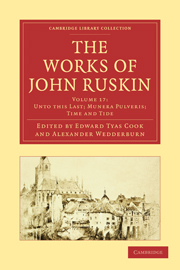Book contents
- Frontmatter
- Contents
- LIST OF ILLUSTRATIONS
- INTRODUCTION TO THIS VOLUME
- PART I “UNTO THIS LAST” (1860)
- PART II “MUNERA PULVERIS” (1862, 1863)
- PART III “TIME AND TIDE, BY WEARE AND TYNE” (1867)
- APPENDIX: LETTERS AND PAPERS ON ECONOMIC SUBJECTS 1863–1873
- I LETTERS ON “MUNERA PULVERIS” (1863, 1875, 1877)
- II THE DEPRECIATION OF GOLD (1863)
- III LETTERS ON THE LAW OF SUPPLY AND DEMAND (1864, 1873)
- IV LETTERS ON WORK AND WAGES TO THE “PALL MALL GAZETTE” (1865)
- V LETTERS ON SERVANTS AND HOUSES TO THE “DAILY TELEGRAPH” (1865)
- VI LETTERS ON RAILWAYS AND THE STATE (1865, 1868, 1870)
- VII SPEECHES ON TRADES UNIONS AND STRIKES (1868)
- VIII EMPLOYMENT FOR THE DESTITUTE POOR AND CRIMINAL CLASSES (1868)
- IX LETTERS ON ROMAN INUNDATIONS (1871)
- X LETTERS ON “HOW THE RICH SPEND THEIR MONEY”(1873)
- XI HOME, AND ITS ECONOMIES (“CONTEMPORARY REVIEW,” MAY 1873)
- Plate section
IX - LETTERS ON ROMAN INUNDATIONS (1871)
Published online by Cambridge University Press: 05 November 2011
- Frontmatter
- Contents
- LIST OF ILLUSTRATIONS
- INTRODUCTION TO THIS VOLUME
- PART I “UNTO THIS LAST” (1860)
- PART II “MUNERA PULVERIS” (1862, 1863)
- PART III “TIME AND TIDE, BY WEARE AND TYNE” (1867)
- APPENDIX: LETTERS AND PAPERS ON ECONOMIC SUBJECTS 1863–1873
- I LETTERS ON “MUNERA PULVERIS” (1863, 1875, 1877)
- II THE DEPRECIATION OF GOLD (1863)
- III LETTERS ON THE LAW OF SUPPLY AND DEMAND (1864, 1873)
- IV LETTERS ON WORK AND WAGES TO THE “PALL MALL GAZETTE” (1865)
- V LETTERS ON SERVANTS AND HOUSES TO THE “DAILY TELEGRAPH” (1865)
- VI LETTERS ON RAILWAYS AND THE STATE (1865, 1868, 1870)
- VII SPEECHES ON TRADES UNIONS AND STRIKES (1868)
- VIII EMPLOYMENT FOR THE DESTITUTE POOR AND CRIMINAL CLASSES (1868)
- IX LETTERS ON ROMAN INUNDATIONS (1871)
- X LETTERS ON “HOW THE RICH SPEND THEIR MONEY”(1873)
- XI HOME, AND ITS ECONOMIES (“CONTEMPORARY REVIEW,” MAY 1873)
- Plate section
Summary
To the Editor of the “Daily Telegraph”
Sir,—May I ask you to add to your article on the inundation of the Tiber some momentary invitation to your readers to think with Horace rather than to smile with him?
In the briefest and proudest words he wrote of himself he thought of his native land chiefly as divided into the two districts of violent and scanty waters:
“Dicar, qua violens obstrepit Aufidus,
Et qua, pauper aquæ, Daunus agrestium
Regnavit populorum.”
Now the anger and power of that “tauriformis Aufidus” is precisely because “regna Dauni præfluit”—because it flows past the poor kingdoms which it should enrich. Stay it there, and it is treasure instead of ruin. And so also with Tiber and Eridanus. They are so much gold, at their sources,— they are so much death, if they once break down unbridled into the plains.
At the end of your report of the events of the inundation, it is said that the King of Italy expressed “an earnest desire to do something, as far as science and industry could effect it, to prevent or mitigate inundations for the future”
Now science and industry can do, not “something” but everything, and not merely to mitigate inundations—and, deadliest of inundations, because perpetual, maremmas—but to change them into national banks instead of debts.
- Type
- Chapter
- Information
- The Works of John Ruskin , pp. 547 - 552Publisher: Cambridge University PressPrint publication year: 2010First published in: 1905

